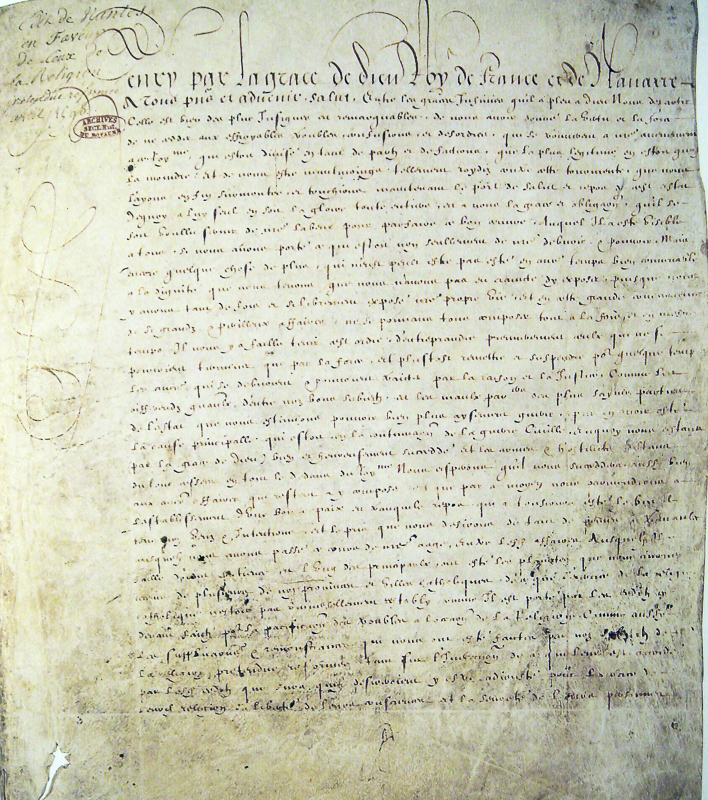It contained 92 general articles signed by the king April 3 1598 56 particular or secret articles signed May 3 and three brevets. We have also given permission to all lords gentlemen and other persons citizens or otherwise who profess the so-called Reformed religion and have the right of high justice within our kingdom and country under our authority or a full fief with military service plein fief de haubert as in.
 Edict Of Nantes Definition And Synonyms Of Edict Of Nantes In The English Dictionary
Edict Of Nantes Definition And Synonyms Of Edict Of Nantes In The English Dictionary
The Edict of Nantes 1598 The Edict of Nantes is one of the great acts of religious tolerance.
Edict of nantes summary. The purpose of the law was to make peace after the French Wars of Religion. It was enacted by Henri IV to end religious wars but by the time Louis XIV became king the. It was one of the first decrees of religious tolerance in Europe and granted unheard-of religious rights to the French Protestant minority.
Aufgehoben was zur Massenflucht der Hugenotten aus Frankreich führte. As a result they lost all social identity. Foundational Myths By the Edict of Nantes April 1598 the first Bourbon king of France Henri IV Henri de Bourbon 15531610 sought to draw a line under the civil and religious conflicts that had afflicted France since 1562 the period commonly known as the wars of religion.
Henry aimed at promoting civil unity by the edict. The Edict of Nantes was a law that allowed people to be Protestants in France from 1598 to 1685. Visit fiveableme for more videos that cover everything you need to know for the AP exam - - - - - - - -Fiveable is the place to be for AP studying.
Henry IV of France by Frans Pourbus the Younger. It stemmed from the French Religious Wars which tore the country apart. Das Edikt von Nantes Das Toleranzedikt von Heinrich IV.
The Edict of Nantes had been issued on 13 April 1598 by Henry IV of France and granted the Calvinist Protestants of France also known as Huguenots substantial rights in the predominantly-Catholic state. Signed by Henry IV of France at Nantes on April 13th 1598 the edict put a temporary end to the ferocious religious wars between Roman Catholics and Protestants which had torn France apart since the 1560s. The Edict of Nantes 1598 The Edict of Nantes was issued by Henry IV who had to pressure the French provincial courts parlements to accept.
The Edict of Nantes gave religious freedom to Protestants in Catholic France. It was signed in Nantes by King Henry IV in April 1598 although some provinces blocked it until 1610. 1598 decree promulgated at Nantes by King Henry IV to restore internal peace in France which had been torn by the Wars of Religion.
Quick Reference 13 April 1598 an edict signed at Nantes by King Henri IV who granted the Huguenots his former co-religionists extensive rights and confirmed earlier edicts of 1564 and 1570. The Religious Wars including the eight outbreaks of violence occurred during the reign of Henry III who succeeded Charles IX. Jahrhundert die Religionsfreiheit in Frankreich.
Edict of Nantes law promulgated on April 13 1598 by Henry IV of France which granted a large measure of religious liberty to his Protestant subjects the Huguenots. Overview Edict of Nantes. The Edict of Nantes.
Am 18101685 wurde es von König Ludwig XIV. The edict treated some Protestants with tolerance and opened a path for secularism. From repression to Revocation.
NANTES EDICT OF. The edict defined the rights of the French Protestants. Musée protestant The 17th century The period of the Revocation of the Edict of Nantes 1661-1700 The Revocation of the Edict of Nantes by Louis XIV in 1685 led to the suppression of the Reformed Church in France and forced Protestants into exile or hiding.
A proclamation issued by henry iv of France April 13 1598 providing a measure of toleration civil rights and liberties and security for French huguenots. Of the numerous assassinations and atrocities carried out by both sides the most notorious.
Popular Posts
-
Most of the agricultural societywas largely supported by the feudal system social hierarchy. The Feudal System was introduced to England fol...
-
Indian National Congress 1885. N the official name for Congress3 Collins English Dictionary Complete and Unabridged 12th Edition 2014 Harper...
-
He ruled from 5 April 1462 to 27 October 1505 he was known as Ivan the Great and was a Grand Prince of Moscow. 29 October 1603 Moscow Russia...
Featured Post
eyes but cannot see verse
83 Bible Verses about Have Eyes But Do Not See . “Son of man, you dwell in the midst of a rebellious house, who have eyes to see, but ...

ads
